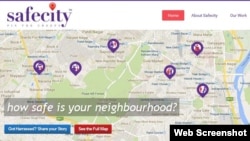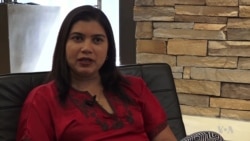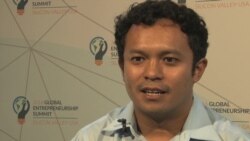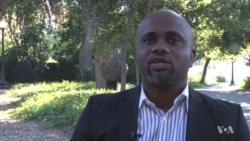Appalled at the incidence of sexual harassment and abuse in India’s cities, ElsaMarie D’Silva co-founded the Red Dot Foundation, whose crowdsourcing platform collects anecdotes and data, then maps dangerous and safe public spaces.
Inspired by a cousin’s medical work in Myanmar, Michael Lwin left his job as a U.S. corporate attorney to join his relative in setting up Koe Koe Tech, a social enterprise providing mobile health information to improve maternal and child health in the Asian country’s rural areas.
D’Silva and Lwin are among more than 700 innovators and investors gathered for the 2016 Global Entrepreneurship Summit at Stanford University in California’s tech-centric Silicon Valley. President Barack Obama addressed them Friday as summit-goers wrapped up three days of talks, workshops, mentoring, networking and pitch competitions designed to woo investors.
WATCH: ElsaMarie D'Silva on mapping
“I believe all of you represent all the upside of an interconnected world, all the optimism and the hope,” the president said, after acknowledging the economic upheaval contributing to Britons’ vote Thursday to leave the European Union. The White House had opposed Brexit.
Entrepreneurship, the president said, “empowers people to come together and tackle our most pressing problems.”
Local issues, global relevance
Many of the entrepreneurs, coming from 170 countries, set out to address local challenges but found their solutions could have broader relevance.
The Red Dot Foundation’s sexual harassment mapping app, launched in December 2012, has become the largest crowd-sourced map in India, Kenya, Cameroon and Nepal, D’Silva notes in her bio as an Aspen Institute New Voices fellow. The app, called Safecity, has a catchy slogan: “Pin the creeps.”
“We thought it was going to be only an online platform where people would come together and report anonymously their personal experiences of sexual violence in public spaces,” D’Silva, the foundation’s co-founder and managing director, told VOA.
Instead, the Safecity app serves as a tool to further engage communities and enhance public safety. The foundation leads public education campaigns about sexual violence and related legislation. It encourages reticent victims to tell their stories. And it collaborates with community groups, other NGOs and local police “to find relevant neighborhood solutions using evidence-based data,” D’Silva said.
“… We’ve seen a lot of good work where police have changed their beat patrol timings or increased patrolling,” she added. “Municipal authorities have fixed infrastructure like street lighting.”
WATCH: Michael Lwin on his health care app
Koe Koe Tech targets Myanmar
Lwin’s Koe Koe Tech also has expansion plans – for Myanmar. The Rangoon-based company, which Lwin started with his cousin Yarzar in May 2013, has grown to 25 employees. Earlier this month, it was awarded $150,000 from the U.S. Agency for International Development. The money will support testing the health impact of its app, called “maymay,” and scaling up its use throughout Myanmar.
More than two-thirds of the country’s residents live in rural areas with limited health care access and only a third of pregnant women deliver their babies at health facilities, Lwin said. That puts them “at great risk for complications, right?”
But widely available smartphones and the maymay app put some health care within reach, Lwin said. He estimated it makes 1,500 physicians available for phone consultation or video chats. “Soon, it’ll be 10,000 doctors available.”
The entrepreneur’s own Myanmar-born parents immigrated to the United States to study medicine before he was born. “So I had the benefit of this geographic lottery,” Lwin said. He was motivated to set up business in their homeland as part of “trying to understand where my parents came from.”
WATCH: Ozoigbo on building team around yourself
Building business acumen
Nigerian-born Stephen Ozoigbo said he also feels an obligation to aid his native country and continent. A longtime Californian, he said he uses his Silicon Valley-based African Technology Foundation to build fellow Africans’ business acumen and “risk appetite” and to help emerging entrepreneurs find resources.
“African entrepreneurs are challenged by knowledge gaps … that we see cut across the entire cycle,” said Ozoigbo, who holds advanced degrees in information technology and business and describes himself as a serial entrepreneur.
Like D’Silva and Lwin, Ozoigbo sees mobile phone technology as a key “empowerment tool,” especially for women entrepreneurs.
“Women can go to school on the phone” and use it to conduct business and seamless transactions, “taking more control of their own financial lives and economics,” he said.
Regardless of their sex, African entrepreneurs also must overcome risk aversion, he added.
“The fear of failure in Africa is a cultural fear, so we also need to work on our risk appetite in looking at certain markets, certain environments, where we can actually make change happen – and understanding local problems and solutions,” he said.
“Connecting the continents to the West, particularly Silicon Valley, is our main path for trying to bridge some of these gaps.”
U.S. benefits
Whether addressing community problems or building connections for companies and countries, the summit's entrepreneurs stand to gain much more than investors.
Their home countries will profit, too.
U.S. officials said that the more they invest in entrepreneurship abroad, the more those communities become markets for American-made goods.
VOA’s Esha Sarai contributed to this report.








